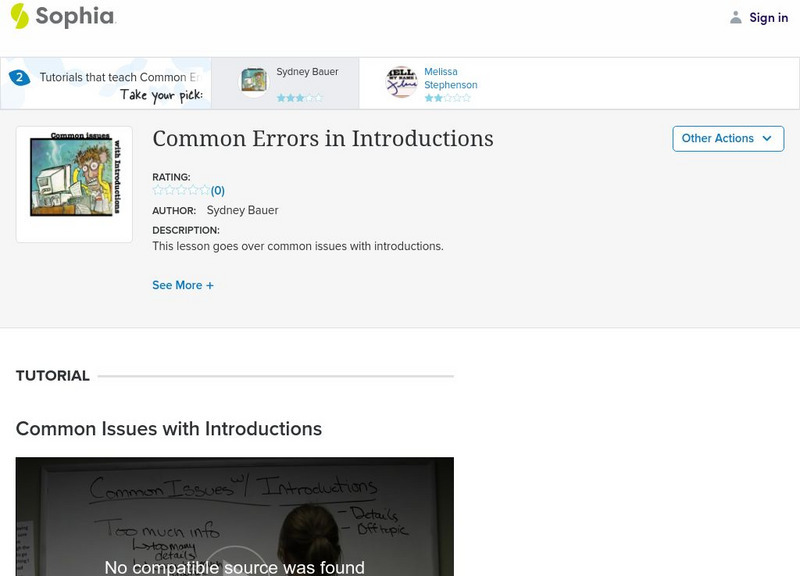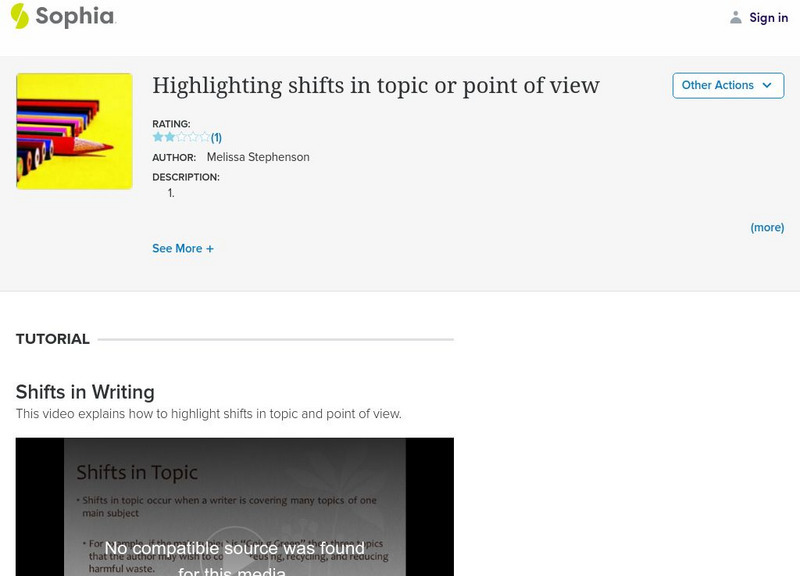Hi, what do you want to do?
PBS
Jane Eyre 3: The Governess
The third episode in the Masterpiece Jane Eyre series focuses on the episode in which Jane has been invited to bring Adele to meet Lady Ingram and her daughter Blanche. Viewers are asked to compare how the film and the novel convey...
Curated OER
Capturing Authentic Narratives
“Authentic narrative is the glue that connects people.” So says the narrator of this short video who models for young journalists how to craft the questions and identify the sources that will yield the information needed to create a...
TED-Ed
Three Anti-Social Skills to Improve Your Writing
"What?" she said. "That video just told me to eavesdrop, get to know imaginary people, and talk to myself. Interesting." It's all for a good cause, though! These three techniques will help your young writers improve their fictional...
TED-Ed
The Case Against "Good" and "Bad"
Good and bad are put on trial for covering up the truth with vague descriptions. How dare they lie like that! See if the presenter can convince your class to ban these words and replace them with more precise, descriptive, and...
Sophia Learning
Sophia: Common Errors in Introductions
This video lesson focuses on writing introductions and common issues with introductions. It discusses the use of details and information -- too much or not enough and being off topic. It suggests using specific language in the...
Sophia Learning
Sophia: General and Specific Audiences
This video lesson focuses on analyzing your audience and tailoring your writing to it. It discusses the 4 types of audiences: real, intended, general, and specific; it explains how to choose writing styles such as tone, vocabulary, and...
Sophia Learning
Sophia: Highlighting Shifts in Topic and Point of View
This tutorial focuses on shifts in topic and point of view in writing using two videos. The first video defines shifts in writing, how to indicate a shift in topic by using transition words, subheadings, or a change in font, how to...
Sophia Learning
Sophia: Introductions
This video lesson focuses on introductions including the role of an introduction and what it includes. It discusses the length, and methods to hook the reader, and how to make a strong introduction. Real Player is required.
Sophia Learning
Sophia: Narrative Key Elements
This video lesson focuses on the key elements of writing a narrative: point of view, tone, reflective statement, pacing, emphasis, and cohesion. W.9-10.3,3a, 3b, 3c, 3e Narratives, W.11-12.3,3a, 3b, 3c, 3e Narratives
Sophia Learning
Sophia: Anticipating and Responding to Readers' Questions
This tutorial focuses on audiences and anticipating and responding to their questions using 2 videos. The first video focuses on determining, defining, and discussing real, intended, general, and specific audiences and also audience...
Sophia Learning
Sophia: Argumentative Writing: Identifying the Audience
This lesson focuses on identifying and considering your audience in argumentative writing. It discusses the real vs. the intended audience, general and specific audiences, and the target audience. It suggest that you consider your...
Imagine Learning Classroom
Learn Zillion: Plan a Narrative by Constructing an Outline
In this lesson, you will learn how to plan your narrative by constructing an outline. Login gives access to a slideshow as well. [7:19]
Sophia Learning
Sophia: Audience and Writing Style
A screencast lesson defining different types of audience, discussing the importance of determining an audience, and explaining how a writing style should be chosen based on the needs and expectations of the intended audience.[5:18]...
Imagine Learning Classroom
Learn Zillion: Video: Analyze How Point of View Impacts the Meaning of a Story
In this lesson, you will learn how the point of view affects the meaning of the story by identifying when a narrator is reliable and when he is unreliable. [8:20]
PBS
Pbs Learning Media: Literary Elements and Techniques: Conflict
Learn how to identify different types of conflict in literature in this animated video [2:46] from WNET.
Khan Academy
Khan Academy: Origins of Written Language
This Khan Academy resource is a video that covers the origins of the written language.
PBS
Pbs: Language Arts: Resources for Adult Educators: Thesis Statement
An adult educator talks about the thesis statement and how to cluster ideas around it.
Sophia Learning
Sophia: Writing for an Audience
This lesson introduces the concept of writing for an audience. [7:18]





















